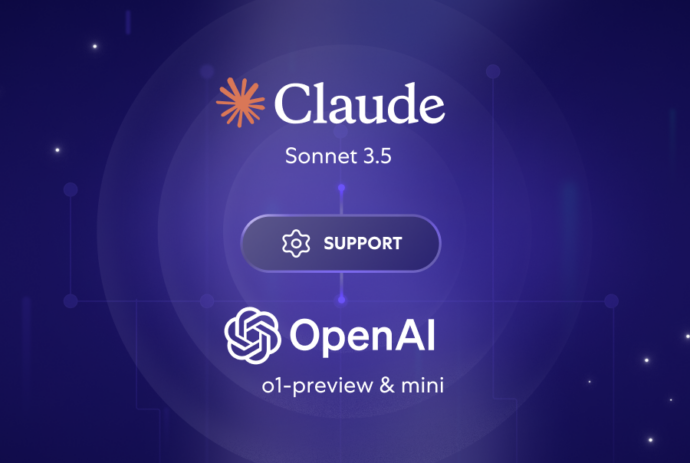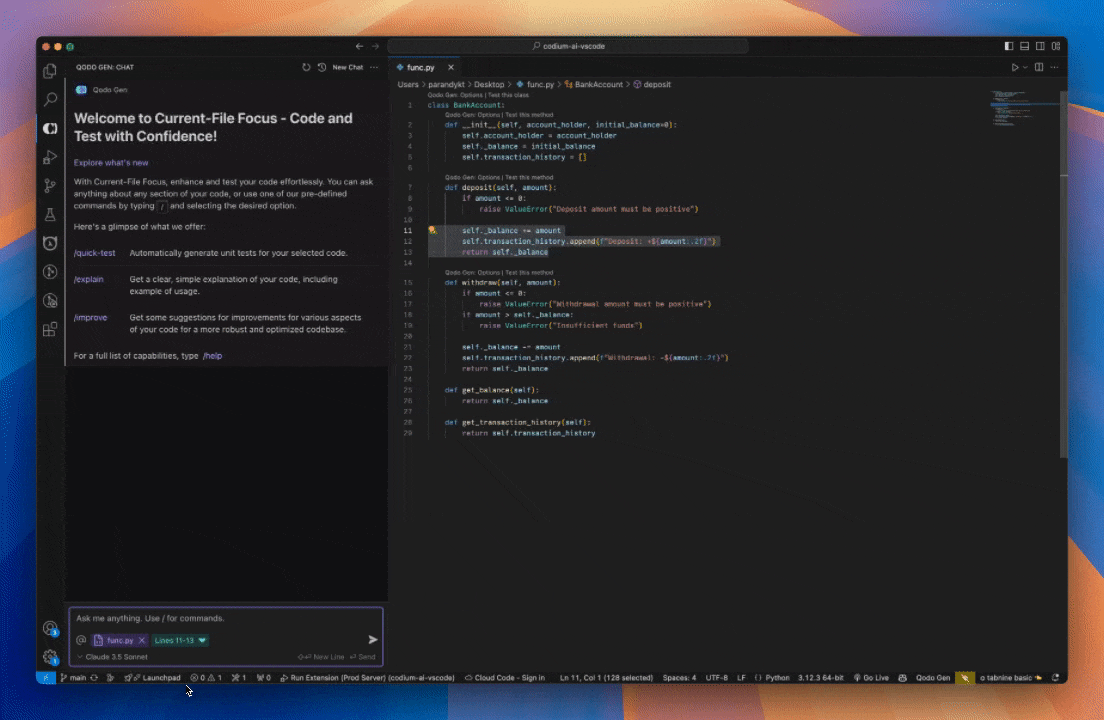![]()
![]()



Qodo Team
October 31, 2024 • 4 min read

AI-driven software development requires access to the most advanced tools and models available. With rapid advancements in large language models, staying ahead means continually integrating cutting-edge technologies. That’s why we’re excited to announce Qodo’s platform support for four models, in addition to the existing support of GPT-4o.
- Anthropic’s upgraded Claude Sonnet 3.5
- OpenAI o1-preview and o1-mini
- Google Gemini 1.5 Pro
Currently in pre-release for VS Code, full access to these models will be released to all users next week. Available for Qodo Gen version 0.12.
By offering seamless access to these models, Qodo gives developers and enterprises the flexibility to tackle the most challenging tasks—whether it’s generating clean code, refactoring legacy scripts, or automating complex coding workflows.
Next gen LLMs: code understanding and reasoning
The recently released Claude Sonnet 3.5, along with OpenAI’s o1, take LLMs to the next step towards system 2 thinking and problem solving, where logic and reasoning replace quick, reactive outposts.
Enhanced performance metrics:
- Claude Sonnet 3.5 has demonstrated substantial improvements in coding tasks over its predecessor. Benchmarked on the SWE Bench, its performance increased from 33.4% to 49%, highlighting its enhanced ability to understand programming concepts and generate accurate code.
- OpenAI’s o1 has shown proficiency in solving competitive programming problems. On the Codeforces Code Contests, it achieved a 55% pass@5 accuracy, significantly outperforming GPT-4o, which scored 23%. This metric indicates the model’s capability to produce correct solutions within the top five attempts, showcasing its advanced problem-solving skills
Key improvements:
Smarter Code Understanding: The new models exhibit an enhanced ability to recognize and interpret programming syntax, logical structures, and patterns within code.
Problem Reasoning: Equipped with reasoning capabilities, these models can help to solve more challenging coding problems that require sequential logic and recursive steps.
Enhanced Natural Language Understanding: Improved comprehension of developer instructions and queries allows the models to interpret nuanced requests, handle ambiguous inputs more effectively, and engage in more natural and productive interactions.
Why model choice matters
AI models are not a one-size-fits-all solution—developers need tailored solutions that align with their unique goals and technical requirements of their organization. The flexibility to select and switch between models enables developers to optimize performance, control costs, and stay ahead in a dynamic AI landscape.
Cost Control
Balancing performance with computational cost is a significant concern in AI development. Advanced models like Sonnet 3.5 offer superior reasoning capabilities but come with increased computational overhead, requiring more memory and processing power. For simpler tasks, lightweight models can deliver adequate performance at a fraction of the cost.
Some tasks—like lightweight chatbot interactions or basic code generation—do not require the heavy computational overhead of advanced models. On the other hand, debugging complex systems might call for the advanced reasoning capabilities of a model like Sonnet 3.5. By allowing developers to switch models as needed, Qodo ensures cost-efficiency without sacrificing performance. This flexibility enables organizations to allocate resources effectively, using simpler models for routine tasks and reserving advanced models for more complex challenges.
Staying ahead in a rapidly evolving AI landscape
As LLMs evolve quickly, developers must adapt just as fast. Today’s most advanced model might not be tomorrow’s best fit. Having access to a dynamic library of models through Qodo ensures enterprises can continually adapt to the latest innovations without missing a beat. Whether it’s Sonnet 3.5 today or an even better model tomorrow, Qodo keeps enterprises ahead of the curve.
Use cases for Sonnet 3.5 and OpenAI o1
Here’s how developers can leverage these new models on Qodo for common scenarios:
- Advanced debugging: Identify hidden logical errors across large codebases, even in recursive functions or complex algorithms.
- Refactoring legacy code: Analyze and suggest improvements for older scripts, enhancing performance and maintainability.
- SQL query generation: Automate the creation of nested queries or optimize existing ones with better indexing logic.
- API call sequences: Generate correct API call structures, complete with error handling and retries.
- Documentation generation: Automatically generate developer documentation from code annotations or source files.
Choosing a model in Qodo:

An essential aspect of flexible model choice is the ease with which developers can switch between different AI models during the development process. Qodo Gen provides an intuitive and seamless interface for model selection directly within the development environment.
- Effortless integration: Access a library of AI models without leaving your coding workspace. This tight integration reduces context switching and enhances productivity.
- Dynamic Model Selection: Easily switch between models—from lightweight models for basic tasks to advanced models like Sonnet 3.5 for more complex challenges—in the same chat. This is achieved in one click, simple selection in Qodo Gen. The last model used will be saved so users don’t have to select it every time.
- Threaded conversations and context preservation: Maintain threaded conversations across model switches. When you switch models, the conversation history and context are preserved and passed to the new model. This ensures continuity in interactions, as the new model can understand and build upon previous exchanges.
- Compare answers across models: Compare responses from different models by asking them the same question. Just click the “up” arrow to paste your latest message, switch to a different model, and click “up” again to see a new answer.
All models will be available with the VSCode and Jetbrains Qodo Gen plugins for free, teams and enterprise multi-tenant users. Get started with Qodo today.

Qodo Team
October 31, 2024
Subscribe to the newsletter






